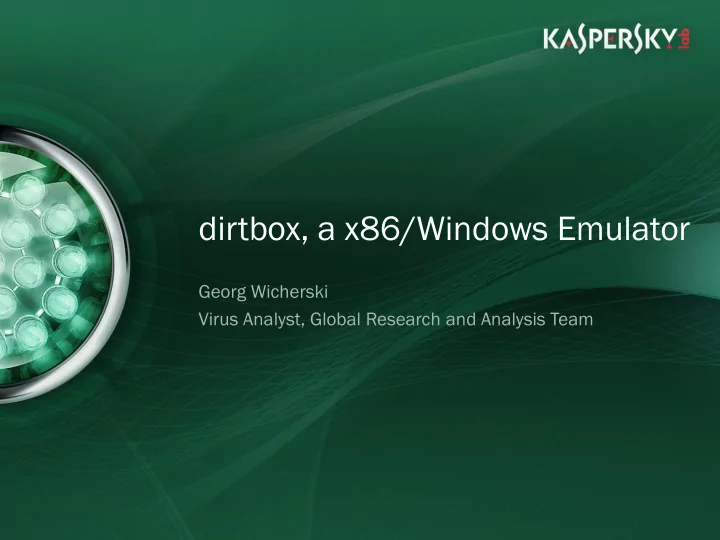

dirtbox, a x86/Windows Emulator Georg Wicherski Virus Analyst, Global Research and Analysis Team
Motivation & System Overview Why not just use CWSandbox, Anubis, Norman‘s , JoeBox , …
Malware are Analys lysis is Sandbox Solutions utions VMWare „ Rootkits “ CWSandbox JoeBox ThreatExpert zBox … Norman Sandbox Anubis 2010-07-11 REcon 2010, Montreal
Malware are Detection tion Emulat lator ors (A/V) V) Most serious A/V solutions have one API level emulation Often pure software emulators Detection by Unimplented APIs Heap Layout, SEH handling , … … 2010-07-11 REcon 2010, Montreal
Det etection ction by by API Side-Ef Effects ects Functions containing try { in VS C++ share code Epilogue is always the same Uses sequence push ecx / ret to return to caller The ecx register belongs to the called function by definition, so it is undefinde upon API return The ecx value can be predicted because it will point to the API‘s ret This breaks a lot of A/V emulators right away There are some funny but trivially detected workarounds Could be used for generic anti-emulation detection (use of undefined registers after SEH protected API calls) Relies on the fact that the API‘s bytecode is not emulated 2010-07-11 REcon 2010, Montreal
Syst stem em Overvie iew or or „A cat pooped into my my sandbo box and now I I have a a dirtbo tbox !“ System Call Layer Emulation of Windows ntdll‘s native code is run inside virtual CPU Ring 0 Other libraries wrap around kernel32 which wraps malware.exe ntdll around ntdll Malware issuing system calls directly supported 2010-07-11 REcon 2010, Montreal
libcpu Custom x86 Basic Block Level Virtualization
libcpu pu Overvie iew Software emulation of x86 bytecode is too slow A lot of additional code, such as ntdll & kernel32 Existing Virtualization solutions are too powerful Implementing their own MMU, support for privileged instructions We want instruction level introspection Homebrew x86 virtualization based on LDT 2010-07-11 REcon 2010, Montreal
x86 Memory y Views Physical Logical Virtual 2010-07-11 REcon 2010, Montreal
x86 Memory y View on Curren rent OS OS Physical Logical Virtual 2010-07-11 REcon 2010, Montreal
x86 Segmentatio mentation Global Descriptor Table Allocated by Operating System Shared among processes Local Descriptor Table Has to be allocated by the OS, too • SYS_modify_ldt • NtSetLdtEntries Process specific, usually not present Define 2 GB guest „ userland “ LDT segment 2010-07-11 REcon 2010, Montreal
Rogue ue Code Executio ecution Basic block level execution on host CPU No instruction rewriting required (thanks to host MMU) Basic block is terminated by Control flow modifying instruction Privileged instructions Exception: Backward pointing jumps Directly copy if points into same basic block Enhanced loop execution speeds Currently no code cache, could cache disassembly results (length of basic block) 2010-07-11 REcon 2010, Montreal
Self-Mo Modifyi difying Code 2010-07-11 REcon 2010, Montreal
libcpu pu Demo 2010-07-11 REcon 2010, Montreal
dirtbox Or „The System Call Implementor‘s Sysiphus Tale“
Why System em Call l Layer r Emulati lation on System Calls mostly undocumented Wine, ReactOS , … We get a lot of genuine environment for free! There is a fixed number of system calls but an unbound number of APIs (think third party DLLs) Some malware uses system calls directly anyway Less detectability by API side effects (because we run original bytecode) 2010-07-11 REcon 2010, Montreal
Thing ngs s for Free: : PE Pa Parsing sing & & Loading ng (!) Process startup handled mostly by new process Creating process allocates new process: NtCreateProcess Creates „ Section “ of new image & ntdll and maps into process, this requires kernel to parse section headers Creates new Thread on Entry Point with APC in ntdll ntdll!LdrInitializeThunk will relocate images if necessary, resolve imports recursively, invoke TLS and DLL startup routines and do magic (see demo). All we have to implement is NtCreateSection & NtMapViewOfSection for SEC_IMAGE → we only need to parse PE‘s section headers! 2010-07-11 REcon 2010, Montreal
Thing ngs s for free: : Accurat ate Heap Implemen ementa tatio tion A lot of A/V emulators naturally come with their own guest heap allocator implementations Some even do not put heap headers before blocks Let alone arena structures , … The Windows heap is implemented in ntdll Interfacing the kernel with NtVirtualAlloc & NtVirtualFree All protections like heap cookies are present Fingerprinting other emulators: Look at malloc(0)-8 , look for proper block header Or overflow until the heap cookie and free 2010-07-11 REcon 2010, Montreal
Thing ngs s for free: : Proper er SEH H Handli ling Generate CONTEXT record from current CPU state Jump to ntdll!KiUserExceptionDispatcher ntdll will do proper SEH handling for us Lookup current top of SEH chain in TEB Walk list, invoke exception handlers with correct flags Checking for SafeSEH structures etc. Trivial detection for other emulators: Link with SafeSEH header Trigger exception with invalid handler registered Check in UnhandledExceptionHandler 2010-07-11 REcon 2010, Montreal
dirtbo tbox Demo 2010-07-11 REcon 2010, Montreal
Conclusion & Future Work Let‘s use this for exploit development!
Det etecting cting dirtbo tbox / Anti-Emu Emulati lation on No leaked registers in Ring 0 transition except for eax Need to provide proper return codes, esp. error codes ntdll just cares about ≥ 0xc0000000 ; malware might look for specific error codes Side effects on buffers etc., especially in error cases Fill out IN OUT PDWORD Length in case of error? Roll back system calls performing multiple things? Tradeoff between detectability and performance 2010-07-11 REcon 2010, Montreal
Future ure Work rk: Adding Tainting ting & SAT Checking ing Already did Proof-of-Concept based on STP Interleave static analysis into dynamic emulation Look for interesting values (e.g. reads from network, date) Do static forward data-flow analysis on usage If used in conditional jumps, identify interesting values with a SAT Checker (there are better domain specific ways, but I‘m lazy) Automatic reconstruction of network protocols (e.g. commands in IRC bots) Identify specific trigger based behaviour Identify Anti-Emulation behaviour 2010-07-11 REcon 2010, Montreal
Questions? Thank You! georg.wicherski@kaspersky.com blog.oxff.net & securelist.com
Recommend
More recommend